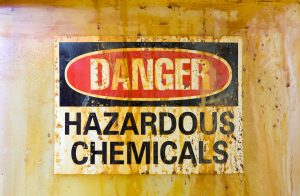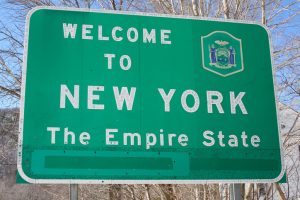 As cybercrimes and data breaches continue to cause significant damage to companies of all types, policyholders are looking to their various insurance policies for coverage to help weather the storm and recoup losses. A recent decision by the U.S. Court of Appeals for the Fifth Circuit highlights the need for companies to review all of their policies for potential cyber-related coverage, including their CGL policies.
As cybercrimes and data breaches continue to cause significant damage to companies of all types, policyholders are looking to their various insurance policies for coverage to help weather the storm and recoup losses. A recent decision by the U.S. Court of Appeals for the Fifth Circuit highlights the need for companies to review all of their policies for potential cyber-related coverage, including their CGL policies.
PFAS Enforcement and Liability Is on the Rise—Insurance Can Help
 A key component of a company’s risk management function is to keep a close eye on new and developing sources of liability and to put in place appropriate insurance to respond in the event those liabilities ripen. In recent years, there has been a significant increase in legal and regulatory attention on per- and polyfluoroalkyl substances, more commonly known as “PFAS” or “forever chemicals.” PFAS are used in countless applications, and many companies across the country bear potential liability, from chemical companies to manufacturers to retailers to corporate end users. PFAS-related enforcement is focused on remedying impacts to both the environment and human health. Importantly, a company’s liability for PFAS-related contamination or bodily injury may be covered under historic general liability policies and/or modern-day pollution liability policies. As regulation and litigation relating to these ubiquitous substances continues to surge, corporate policyholders with potential exposure should be proactive to examine their insurance portfolios and position themselves for potential insurance coverage in the event they become a PFAS liability target.
A key component of a company’s risk management function is to keep a close eye on new and developing sources of liability and to put in place appropriate insurance to respond in the event those liabilities ripen. In recent years, there has been a significant increase in legal and regulatory attention on per- and polyfluoroalkyl substances, more commonly known as “PFAS” or “forever chemicals.” PFAS are used in countless applications, and many companies across the country bear potential liability, from chemical companies to manufacturers to retailers to corporate end users. PFAS-related enforcement is focused on remedying impacts to both the environment and human health. Importantly, a company’s liability for PFAS-related contamination or bodily injury may be covered under historic general liability policies and/or modern-day pollution liability policies. As regulation and litigation relating to these ubiquitous substances continues to surge, corporate policyholders with potential exposure should be proactive to examine their insurance portfolios and position themselves for potential insurance coverage in the event they become a PFAS liability target.
Follow the Leader: How Ambiguities in Excess Follow-Form Policies Can Lead Policyholders Down a Crooked Path
 A feature of most corporate liability insurance programs is the tower system of coverage: a primary policy with several overlying excess policies stacked atop one another collectively providing coverage up to a desired (or available) limit of liability. Depending on the size and liability exposures of a policyholder, a tower can consist of dozens of policies providing limits totaling hundreds of millions of dollars. Adding to this complexity, excess policies often share layers of coverage in quota share arrangements, sometimes subscribing to the same policy but more often issuing separate policies for a stated percentage of the quota share whole. To avoid as much as possible an impenetrable web of conflicting coverage terms, excess policies often “follow form” to the underlying coverage (usually to the primary policy) providing the insurer certainty and providing the policyholder a consistent tower of coverage. It is not always possible, though, to obtain clarity and certainty in tower placements. Insurance companies issuing excess coverage may not wish to agree to all the terms included in the underlying policies, and so may offer additional or differing terms, creating inconsistencies in an otherwise monolithic tower. For example, a primary insurer may refuse to cover punitive damages whereas an excess insurer may agree to do so, or vice versa.
A feature of most corporate liability insurance programs is the tower system of coverage: a primary policy with several overlying excess policies stacked atop one another collectively providing coverage up to a desired (or available) limit of liability. Depending on the size and liability exposures of a policyholder, a tower can consist of dozens of policies providing limits totaling hundreds of millions of dollars. Adding to this complexity, excess policies often share layers of coverage in quota share arrangements, sometimes subscribing to the same policy but more often issuing separate policies for a stated percentage of the quota share whole. To avoid as much as possible an impenetrable web of conflicting coverage terms, excess policies often “follow form” to the underlying coverage (usually to the primary policy) providing the insurer certainty and providing the policyholder a consistent tower of coverage. It is not always possible, though, to obtain clarity and certainty in tower placements. Insurance companies issuing excess coverage may not wish to agree to all the terms included in the underlying policies, and so may offer additional or differing terms, creating inconsistencies in an otherwise monolithic tower. For example, a primary insurer may refuse to cover punitive damages whereas an excess insurer may agree to do so, or vice versa.
Check Your Policies for Privacy Claim Coverage: New York City’s New Biometrics Law Is Now in Effect
 Since July 9, 2021, New York City’s businesses have been subject to the requirements of a new biometrics law. Businesses operating in New York City should consider both their potential liability under these new requirements and whether their current insurance program protects them against associated risks.
Since July 9, 2021, New York City’s businesses have been subject to the requirements of a new biometrics law. Businesses operating in New York City should consider both their potential liability under these new requirements and whether their current insurance program protects them against associated risks.
Insurance Considerations for Cannabis Delivery Services
 The legal cannabis industry in the U.S. is growing at an unprecedented rate and is projected to reach $73.6 billion by 2027. While federal law still classifies marijuana as a Schedule I drug, many states have legalized both medical and recreational marijuana. As state restrictions ease, new business opportunities continue to emerge.
The legal cannabis industry in the U.S. is growing at an unprecedented rate and is projected to reach $73.6 billion by 2027. While federal law still classifies marijuana as a Schedule I drug, many states have legalized both medical and recreational marijuana. As state restrictions ease, new business opportunities continue to emerge.
Covering the Highlight Reel: The Need for Insurance Options to Protect NFT Owners

Winning a championship ring is everything. Just ask the Los Angeles Dodgers, who won 11 National League West titles between their 1988 and 2020 World Series Championships and would likely have traded several of those division titles for more World Series championships. But, of course, not all rings are equal. Neither are sports collectibles.
Zurich Pleads with Court to Ignore Science

In a recent federal court filing, Zurich American Insurance Company asked the district court to ignore the entirety of science regarding COVID-19 in order to support Zurich’s denial of all coverage for COVID-19 business interruption losses.
Insuring a King’s Ransom: The Role of Cyber Insurance in Ransomware Risk Management
 Nearly 700 years ago, England captured King John II of France and held him for ransom for four million écus. But France could not afford to pay, and King John II ultimately traded his two sons as substitute hostages to try and secure his own release.
Nearly 700 years ago, England captured King John II of France and held him for ransom for four million écus. But France could not afford to pay, and King John II ultimately traded his two sons as substitute hostages to try and secure his own release.
The Duty to Defend a Privacy Claim Arises from Even Limited Publication of Biometric Identifiers
 Do general liability policies provide coverage for limited disclosures of biometric data, such as fingerprints? The Illinois Supreme Court has concluded that they do.
Do general liability policies provide coverage for limited disclosures of biometric data, such as fingerprints? The Illinois Supreme Court has concluded that they do.
New York Bad Faith Bill Targets Insurers Behaving Badly
 When Frank Sinatra famously sang “if I can make it there, I’ll make it anywhere,” he was probably not crooning about making a claim for insurer bad faith. New York has indeed acquired a reputation as a difficult place to obtain an award of extra-contractual damages for an insurer’s unreasonable denial of coverage—one reason that insurance companies perceive New York to be a relatively favorable venue for coverage litigation. While New York law does in fact provide remedies for insurer misconduct, a bill recently introduced in the New York State Assembly could further expand policyholder protections. The legislation would create a private right of action for policyholders to sue their insurers (and for injured parties to sue tortfeasors’ insurers directly) for unreasonable refusal or delay of coverage and for categories of damages that include attorneys’ fees, consequential damages, and punitive damages. This sweeping legislation would allow New York to “be a part of it” along with many other states, like California and Washington, that have robust statutory protections against unfair claims practices.
When Frank Sinatra famously sang “if I can make it there, I’ll make it anywhere,” he was probably not crooning about making a claim for insurer bad faith. New York has indeed acquired a reputation as a difficult place to obtain an award of extra-contractual damages for an insurer’s unreasonable denial of coverage—one reason that insurance companies perceive New York to be a relatively favorable venue for coverage litigation. While New York law does in fact provide remedies for insurer misconduct, a bill recently introduced in the New York State Assembly could further expand policyholder protections. The legislation would create a private right of action for policyholders to sue their insurers (and for injured parties to sue tortfeasors’ insurers directly) for unreasonable refusal or delay of coverage and for categories of damages that include attorneys’ fees, consequential damages, and punitive damages. This sweeping legislation would allow New York to “be a part of it” along with many other states, like California and Washington, that have robust statutory protections against unfair claims practices.




